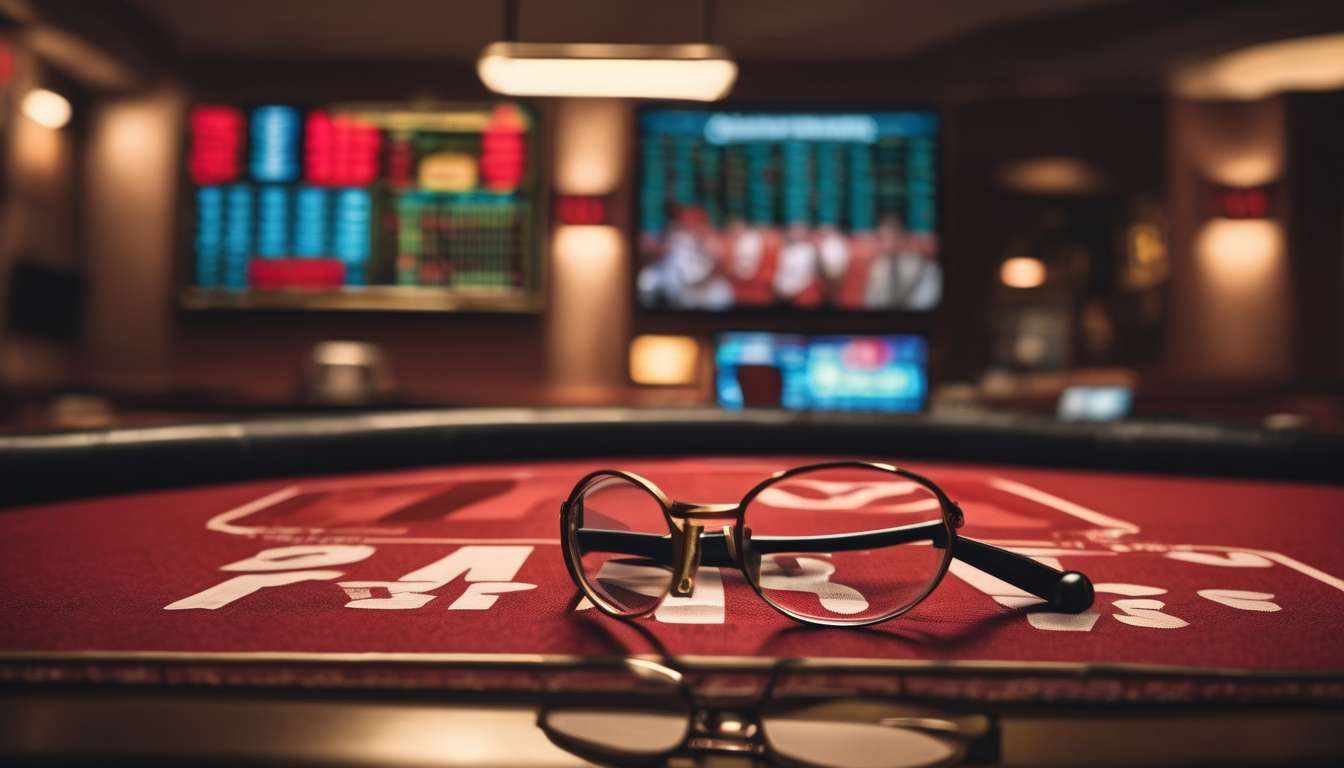In the world of sports betting, we often find ourselves navigating through a jungle of information, trying to discern fact from fiction. Many of us have heard the same myths repeated over and over, and it’s time we set the record straight.
Our goal is to debunk some of the most common misunderstandings surrounding betting odds, so we can all become more informed and strategic bettors. Betting can be as thrilling as it is complex, and misconceptions only add to the confusion. By addressing these myths, we aim to empower ourselves with knowledge, allowing us to approach our bets with confidence and clarity.
Together, we will explore the truths behind these popular myths, separating the reality from the hearsay, and ensuring that we make decisions based on facts rather than fallacies.
Join us as we take a closer look at the seven most prevalent myths about betting odds, and uncover the truth behind each one.
Misconception of Odds Accuracy
Many people mistakenly believe that betting odds are precise predictors of outcomes. We’ve all been there, looking at the odds and feeling confident that they hold the secret to winning. However, odds merely reflect the bookmakers’ estimation of probability, not guaranteed results.
This common fallacy can lead us astray, thinking that higher odds equate to a higher likelihood of success. It’s crucial to remember that odds are influenced by many factors, including:
- Public opinion
- Market dynamics
These factors show that odds are not based on pure mathematical certainty.
When we engage in betting, it’s easy to fall into the trap of assuming odds are foolproof indicators. We want to belong to a community that gets it right, that knows the secret. Yet, it’s essential to approach odds with a healthy skepticism.
Embracing this mindset allows us to:
- Make more informed decisions
- Enjoy the social aspect of betting
- Avoid falling prey to the misconception that odds are infallible predictors
Let’s bet smarter together.
The Fallacy of Hot Streaks
Many of us have been tempted to believe in the myth of hot streaks, thinking a winning streak will inevitably continue. We gather around, sharing stories of our last big wins, feeling part of a community that understands the thrill of betting.
But let’s face it, the odds don’t care about our past successes. The fallacy of hot streaks tricks us into believing that if we’ve won a few times in a row, we’re more likely to win again.
In reality, each bet is independent, and past outcomes don’t influence future ones. The belief in hot streaks can lead us to make irrational bets, thinking we’re on a lucky roll.
This misconception is rooted in our desire for patterns and control. We crave the camaraderie that comes from shared experiences and victories, but it’s crucial to recognize the fallacy.
By understanding the true nature of odds, we can make more informed, rational betting decisions together.
Overestimating Long Shot Chances
We often fall into the trap of overestimating the chances of long shots, believing that a big payout is just around the corner. This common fallacy in betting appeals to our sense of hope and excitement, making us feel like we’re part of an exclusive club of risk-takers.
Key points to consider:
- We tend to overlook the odds, which are designed to reflect the true likelihood of an outcome.
- Long shots are named so for a reason—they’re unlikely to win.
- The allure of a massive payout can cloud our judgment, leading us to make irrational bets.
Understanding Probability:
We must remind ourselves that betting is not just about luck; it’s about understanding probability. The odds stacked against long shots aren’t just numbers—they represent the betting community’s consensus.
By acknowledging this, we can avoid falling into the trap of overestimation and make more informed decisions. Calculated choices are key to successful betting. Let’s stay grounded and remember this critical aspect.
The Gambler’s Fallacy Trap
Many of us mistakenly believe that past outcomes affect future results, falling into the gambler’s fallacy trap. We’ve all been there, thinking that after a series of losses, a win is just around the corner. Yet, this fallacy is misleading.
Odds in betting don’t change based on previous events; each event is independent.
- When we see a roulette wheel land on red multiple times, it doesn’t make black more likely next.
- Instead, each spin holds the same odds.
In our community of bettors, understanding this fallacy is crucial. Believing in patterns where none exist can lead us to make poor bets, chasing losses based on false hope. It’s essential to recognize that betting odds reflect probabilities, not certainties shaped by history.
Let’s remind ourselves, as we place our next bet, that falling into the gambler’s fallacy only clouds our judgment. By acknowledging this, we can make smarter, more informed betting decisions together.
Understanding Odds Payouts
Understanding Payouts and Odds in Betting
Let’s delve into how payouts work, helping us grasp the potential returns from our bets. Understanding odds isn’t just about numbers; it’s about the shared excitement and camaraderie of betting.
The Role of Odds:
- Odds represent the likelihood of an event happening and determine how much we could win.
- When we place a bet, we’re essentially weighing the odds against the payout.
- It’s crucial to recognize that higher odds mean a higher risk but also a potentially bigger reward.
Common Misconception:
- A common fallacy in betting is assuming that high odds guarantee high returns.
- In reality, odds simply reflect the probability, not a promise of payout.
Informed Betting:By understanding this, we join a community of informed bettors who appreciate the nuances of each wager.
Calculating Potential Payouts:
- Calculating potential payouts involves multiplying the amount wagered by the odds.
- For example, betting $10 on odds of 3.0 would return $30, including our original stake.
Conclusion:Let’s continue making educated decisions and enjoy the journey together.
Myth of Guaranteed Wins
Many bettors fall for the myth that certain strategies or insider tips can guarantee wins every time. We’ve all been there, hoping for that foolproof method to beat the odds. However, the reality is that believing in guaranteed wins is nothing but a fallacy.
In the world of betting, odds are unpredictable and constantly changing, making it impossible to secure a win every single time.
As a community of bettors, we often crave a sense of belonging and the idea that we’ve cracked the code. But the truth is, no matter how much we share insights or follow trends, there’s no magic formula.
Betting involves risk, and that’s part of the thrill. Embracing this uncertainty can actually make us more informed and responsible bettors.
Let’s not fall into the trap of believing in myths. Instead, let’s focus on:
- Enjoying the process
- Learning from each experience
- Understanding that losing is part of the game
Together, we can navigate the unpredictable world of betting with a clear, realistic mindset.
Impact of Public Betting
The Influence of Collective Betting
Many of us underestimate how the collective actions of public betting can significantly sway odds and outcomes. When we all jump on the same betting bandwagon, believing in a certain outcome, we contribute to a shift in odds that doesn’t always reflect the true probability of an event.
The Fallacy of Popular Bets
This collective behavior often leads to the fallacy that popular bets are safe bets. However, this isn’t always true; what we perceive as a sure thing can be an illusion created by the masses.
Understanding Bookmaker Adjustments
As bettors, we should understand that our actions influence bookmakers.
- When a large number of us place bets on one side, bookmakers adjust the odds to balance their risk.
- This adjustment can create an artificial sense of security or panic, depending on which side of the bet we’re on.
Making Informed Decisions
By recognizing this dynamic, we can make more informed decisions and avoid falling into the trap of betting based on skewed odds rather than well-researched probabilities.
Unraveling the Odds Paradox
Many of us find ourselves puzzled by the paradox where odds don’t always align with actual probabilities. In the world of betting, odds are meant to represent the likelihood of an event occurring, yet we often encounter scenarios where these odds feel misleading. This discrepancy can be attributed to the fallacy that odds are purely mathematical. Instead, they’re influenced by factors like:
- Public perception
- Market dynamics
We must recognize that while odds provide a framework, they don’t guarantee outcomes. This fallacy is particularly prevalent when a favorite team is involved. The odds might suggest a high probability of victory, but unexpected variables can easily turn the tables.
It’s crucial for us to differentiate between odds and probability, understanding that the former is a reflection of collective sentiment rather than a precise prediction.
By acknowledging this, we can navigate the betting landscape with greater insight. Let’s embrace the community of informed bettors who grasp the nuances behind the odds paradox.
How are betting odds calculated in different sports?
Betting Odds Calculation
We calculate betting odds differently in various sports based on several factors:
-
Statistical Analysis: This involves using data and statistics to predict outcomes and set odds.
-
Team Performance: Current form and recent results of the teams involved play a significant role in determining odds.
-
Team Strength: This includes evaluating the overall quality and capabilities of a team.
-
Player Injuries: The absence of key players can heavily influence the odds.
-
Historical Data: Past performances and head-to-head records are considered to forecast possible outcomes.
Importance of Understanding Betting Odds
Understanding these calculations helps us make informed decisions when placing bets.
-
It’s crucial to research and stay updated on the latest trends to increase our chances of winning bets across different sports.
-
Each sport has its unique method to determine odds, which means bettors need to adapt their strategies accordingly.
By keeping these factors in mind, bettors can enhance their chances of success.
What factors should be considered when choosing a betting strategy?
When choosing a betting strategy, we consider various factors:
- Risk Tolerance: Understand how much risk you’re willing to take.
- Knowledge of the Sport: Familiarity with the sport can provide an edge.
- Past Performance Trends: Analyze historical data to identify patterns.
Setting Clear Goals and Budget:
- Establish what you aim to achieve with your betting.
- Stick to a predetermined budget to avoid overspending.
Research and Analysis:
- Analyze odds to find value bets.
- Study teams/players to understand strengths and weaknesses.
- Track statistics to make data-driven decisions.
Key Principles:
- Discipline: Stay focused and avoid impulsive bets.
- Consistency: Apply your strategy consistently for the best results.
- Patience: Understand that success may take time.
By staying disciplined and doing thorough research, we can make informed decisions. Consistency and patience are key to finding a strategy that works best for us.
How does the house edge affect my betting outcomes?
The House Edge and Its Impact on Betting Outcomes
The house edge is a critical concept in gambling as it provides the casino with a statistical advantage over time. This advantage means that, on average, players are likely to lose more money than they win in the long run.
Understanding the House Edge
- The house edge is the percentage of each bet that the casino expects to keep over the long term.
- It varies depending on the game and specific rules in play.
Importance of the House Edge in Betting Strategy
-
Expectation Management:
- Recognizing the house edge helps players set realistic expectations.
- It prevents unrealistic hopes of consistent short-term winnings.
-
Informed Decision-Making:
- By understanding this concept, bettors can make more informed choices about which games to play and how much to wager.
- It aids in selecting games with lower house edges for a better chance of retaining winnings.
-
Responsible Gambling Practices:
- Acknowledging the house edge encourages players to adopt responsible gambling habits.
- It promotes a mindset focused on entertainment rather than profit.
By embracing the concept of the house edge, players can approach betting with a realistic mindset, leading to more enjoyable and responsible gambling experiences.
Conclusion
In conclusion, debunking these common odds myths can help you make more informed betting decisions.
Key Points to Remember:
- Odds are not always accurate predictors.
- Hot streaks are just luck.
- Long shots are unlikely.
- Past outcomes don’t affect future ones.
Considerations for Better Betting:
- Understand payouts.
- Avoid the gambler’s fallacy.
- Consider public betting trends.
By unraveling these myths, you can approach betting with a more realistic perspective and increase your chances of success.




